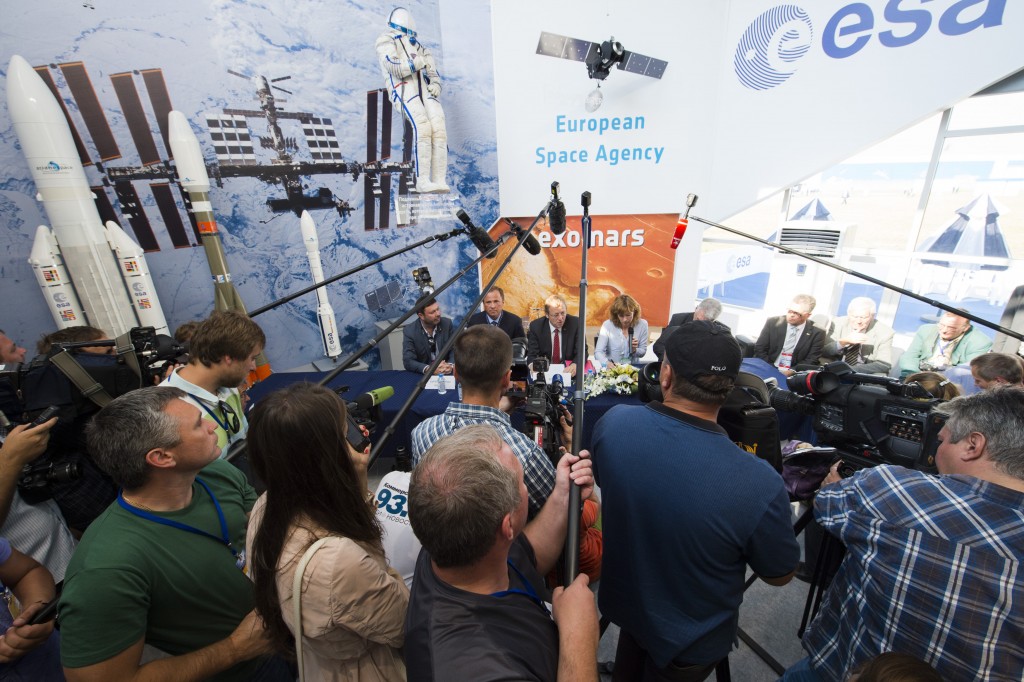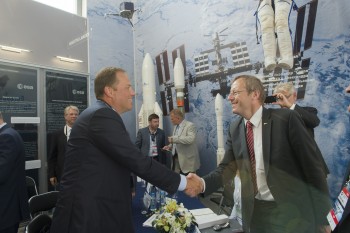
Media Briefing of Jan Woerner, ESA Director General, and Igor Komarov, Head of the Russian Federal Space Agency (Roscosmos), on 26 August 2015, at the ESA chalet, MAKS international aviation and space show, in Zhukovsky near Moscow. Image Credit: ESA, S. Corvaja.
While still enjoying the transition into the ESA structure, I have had to tackle several issues already.
Relations between ESA and the European Commission I mentioned in my previous blog post: There needs to be a clear common understanding with regard to who is doing what and who is responsible for what. I believe this is an easy task if all those involved want to find a solution. It is very good that the European Commission, after decades, is at last exploring the importance of space and is eager to be active in this field which, for Europe, has been developed through ESA since the Sixties. I therefore look forward to a sound solution being identified that fulfils the requirements of our common shareholders: the Member States and their citizens.
Last week I had the pleasure to represent ESA at MAKS, the International Aviation and Space Salon in Zhukovsky, near Moscow. As in the previous year when I went to MAKS as the Chairman of the Executive Board of DLR, the German Aerospace Center, various discussions with representatives of different institutions took place. Due to the Ukraine crisis there are now some additional clouds on the political horizon. Already back in 1975, space, with the rendezvous of Apollo and Soyuz in orbit, proved that it can have a bridging function that transcends earthly political problems. We should therefore work together to sustain and enhance international cooperation now and in the future; the global community expects that from us. This does not mean that one should forget about political constraints, human rights or societal values; it means that we should understand that cooperation, especially in science, research and space, becomes even more important in difficult times.
These days have also cast a shadow on me personally. My close co-worker Andrea Boese lost her battle with illness after months of fighting and hoping, and died on Saturday evening. She had already supported me at DLR and intended to do the same here with a focus on the culture at ESA. Andrea Boese had a worldwide network of professional relations and was respected for her very intensive work. Her passing led to numerous reactions from many different persons, expressing their respect and admiration.
Now I am faced with restructuring the organisation in my immediate environment even before the planned version could become effective. In such moments of mourning and sadness, all daily problems lose their weight. However, unfortunate as it may be, these feelings inevitably fade away as we head towards the next “urgent” matter.


Discussion: 5 comments
It’s very good to hear from you again, Jan, and I am so very sorry to hear of the death of your dear colleague Andrea. Which I can see will be both a professional and a personal loss for you. For what little support that they can be, you have my deepest commiserations and warmest thoughts.
Margarita
One always says that hardships make us grow, but this very sad event is nevertheless really difficult to overcome for you and those having appreciated Andrea, her intelligence, her dedication and her original way of thinking.
All my sympathy in this difficult moment.
Dear Jan Woerner,
my deepest regrets about the loss of one of your closest colleages Andrea. It is hard to loose such true and reliable shoulders that shared so many loads …
Cordially
Götz AvB
Dear Jan Wörner,
on behalf of the IAF Human Spaceflight Committee I would like to express my sincere condolations over the passing of your close solleague Andrea. I experienced her manyfold activities in WIA and many IACs in the past years. We will miss her initiative and drive at many occasions and of course very soon in Jerusalem.
Cristian Bank
Chairman IAF Human Spaceflight Committee
I would like to express my personal shock and deep sadness at the loss of such a vibrant, energetic, passionate and charming colleague – Andrea Boese. Thank you, Jan, for your words. Yes, the ongoing work of moving the space enterprise along will, naturally, soften the blow, however, I hope that we will collectively find a way to commemorate her outstanding and long-lasting contribution to our activities.
David Kendall